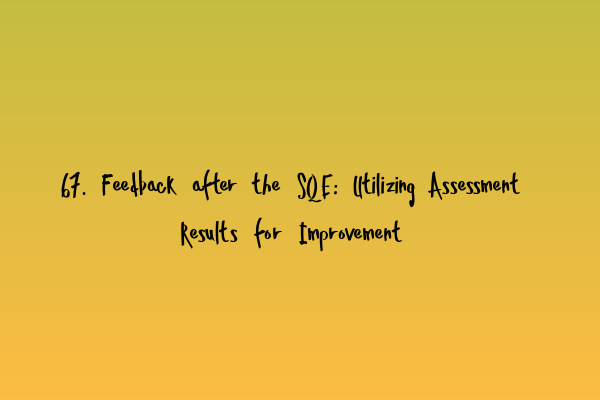Feedback after the SQE: Utilizing Assessment Results for Improvement
Now that the grueling process of taking the Solicitors Qualifying Exam (SQE) is complete, it’s time to reflect on your performance and utilize the feedback received to improve for future assessments. The SQE has been designed to assess a range of legal skills and knowledge, and understanding how to analyze your results is key to enhancing your performance. In this blog post, we will explore the importance of feedback, how to interpret your assessment results, and strategies for improvement.
The Power of Feedback
Feedback plays a crucial role in the learning and development process. It provides you with valuable insights into your strengths and weaknesses, allowing you to focus your efforts on areas that require improvement. The SQE offers detailed feedback on your performance in different areas, providing you with a roadmap for further study and growth.
When you receive your feedback, it’s important to approach it with an open mind and a willingness to learn. Understand that feedback is not meant to criticize but to guide you towards improvement. Embrace it as a tool for progress.
One way to make the most of your feedback is to compare it with the exam syllabus and the expected performance standards. This will help you identify areas where you fell short and areas where you excelled, allowing you to create a personalized study plan.
Additionally, take note of any recurring feedback you receive. If multiple assessors highlight the same skill or knowledge gap, it’s a clear indicator of an area that requires attention. Use this information to prioritize your study efforts.
Interpreting Assessment Results
Understanding how to interpret your assessment results is crucial for effective improvement. The SQE assesses your abilities through a combination of multiple-choice questions (MCQs), written tasks, and oral assessments. Each type of assessment provides different insights into your performance.
When analyzing your performance on MCQs, pay attention to the specific areas where you struggled. These questions often cover fundamental legal principles and concepts. Consider revisiting the relevant materials and resources, such as the Conquer the Multiple Choice Questions (MCQ) in SQE1 article, to strengthen your knowledge base.
For written tasks, review the feedback on your legal analysis, reasoning, and problem-solving skills. Take note of any structural or formatting issues raised by assessors. Practice writing under timed conditions and seek guidance from mentors or tutors to help refine your writing style.
Oral assessments provide an opportunity to gauge your communication skills, including your ability to articulate legal ideas and present persuasive arguments. Revisit the core subjects and refresh your understanding of key concepts, which are covered in the Focus Areas in SQE1 and SQE2: Mastering Key Concepts article, to enhance your oral performance.
Strategies for Improvement
Now that you have thoroughly analyzed your assessment results, it’s time to implement strategies for improvement. Here are some key steps to consider:
1. Create a Study Plan:
Based on the feedback received, develop a study plan that focuses on your weaker areas. Break down your study sessions into manageable chunks and allocate sufficient time to each topic. Prioritize topics that have been highlighted in multiple assessments.
2. Practice with Sample Papers:
Utilize SQE sample papers to practice tackling different types of questions and tasks. This will help you familiarize yourself with the exam format, refine your time management skills, and gain confidence in your abilities. Check out the SQE Sample Papers: Practice for Exam Success article for more guidance.
3. Seek Expert Guidance:
Consider seeking guidance from experienced tutors or mentors who can provide personalized support and advice. They can help identify your strengths and weaknesses, suggest helpful resources, and provide tips for exam preparation.
4. Review Mock Performance:
If you have taken mock exams, consider reviewing your performance and feedback with expert tutors or participating in mock debrief sessions. This will help you gain insights into your exam strategy and identify areas where you can make improvements. You can learn more about this in the Adjusting Your SQE Strategy Based on Mock Performance and SQE Mock Debrief Sessions: Critical Steps for Improvement articles.
5. Consistent Practice and Revision:
Lastly, remember that consistent practice and revision are key to success. Set aside dedicated study time each day and regularly revise the topics you have covered. Active engagement with the materials is essential to reinforce your knowledge and ensure retention.
By implementing these strategies and utilizing the feedback and resources available, you can enhance your performance in future SQE assessments. Remember, improvement is a journey, and with perseverance and dedication, you can achieve your goals.
